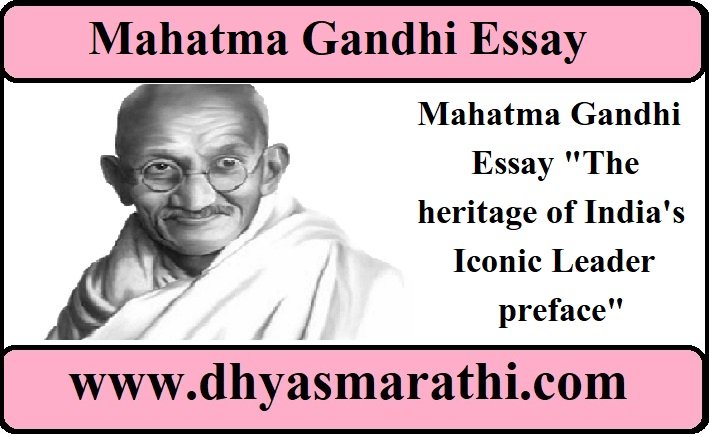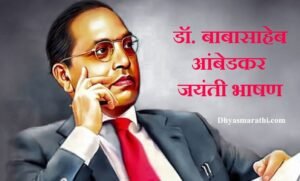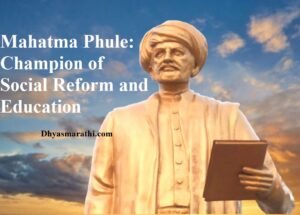Mahatma Gandhi Essay : The heritage of India’s Iconic Leader preface

Mahatma Gandhi Essay : Mahatma Gandhi, a name synonymous with pacifism, verity, and social change, is a hallowed figure in India and around the world. This essay explores the life, principles, and enduring heritage of Mahatma Gandhi, the man known as the” Father of the Indian Nation.” From his early life to his vital part in India’s struggle for independence, Gandhi’s trip is a testament to the power of peaceful resistance and his dateless communication of justice and equivalency.
Early Life and Education
Mohandas Karamchand Gandhi, affectionately known as Mahatma Gandhi, was born on October 2, 1869, in Porbandar, Gujarat, India. Growing up in a modest family, he imbibed values of simplicity and probity from his parents. His father served as the diwan( chief minister) of Porbandar, exposing youthful Gandhi to governance and administration.
Gandhi’s educational trip began in Porbandar and continued in Rajkot. Although not a name pupil academically, he was famed for his honesty and industriousness. In 1888, he left for London to study law, an experience that introduced him to Western culture while he remained deeply embedded in his Indian heritage.
South Africa and the Birth of Satyagraha
After completing his legal studies in London, Mahatma Gandhi embarked on a legal career in South Africa. It was there that he brazened the harsh realities of ethnical demarcation, a vital moment that catalysed his metamorphosis into a social and political activist. Being ejected from a” whites- only” train cube left an unforgettable mark on him, kindling his passion for justice.
In South Africa, Gandhi developed his gospel of peaceful resistance, which he nominated” Satyagraha.” Satyagraha, meaning” verity force” or” soul force,” came the foundation of his life’s work. Gandhi believed that pacifism wasn’t a sign of weakness but a incarnation of great moral strength. Through peaceful demurrers, civil defiance, and an unvarying commitment to verity, he sought to combat injustice and secure the rights of marginalized communities.
Return to India and the Struggle for Independence
In 1915, Mahatma Gandhi returned to India, fortified with the principles of Satyagraha and a hot commitment to social and political change. He fleetly surfaced as a prominent leader in the Indian National Congress, a vital association in the struggle for India’s independence from British social rule.
Gandhi’s vision was clear to attain tone- rule for India through peaceful means. He prompted Indians to swap British- made goods, engage in acts of civil defiance, and peacefully kick rough British programs. His leadership and principles electrified a nation, transcending indigenous, religious, and socioeconomic boundaries.
One of the most iconic moments in India’s pursuit of independence was the Salt March of 1930. Gandhi, along with a group of followers, embarked on a 240- afar journey to the Arabian Sea, where they made swab from seawater, challenging the British monopoly on swab product and distribution. This emblematic act reverberated worldwide and fostered the cause of Indian independence.
The Enduring Legacy of Mahatma Gandhi
Mahatma Gandhi’s unvarying commitment to pacifism and verity continues to reverberate through history. His gospel of Satyagraha has inspired civil rights movements, leaders like Martin Luther KingJr. and Nelson Mandela, and innumerous individualities devoted to justice and equivalency. He demonstrated that moral strength and pacifism can bring about monumental change, indeed in the face of immense adversity.
Gandhi’s impact extended beyond politics. He supported for women’s rights, challenged the estate system, and promoted profitable tone- adequacy through the spinning of Khadi( folksy cotton). His vision for an independent India was one of concinnity, harmony, and social justice.
Assassination and Conclusion
Tragically, Mahatma Gandhi’s life was cut short on January 30, 1948, when he was assassinated by Nathuram Godse, a Hindu revolutionist who dissented with Gandhi’s inclusive approach to religion and his station on the partition of India. His assassination was a moment of profound mourning for the entire nation and the world.
Conclusion
In conclusion, Mahatma Gandhi’s life and heritage endure as a testament to the power of pacifism, verity, and unwavering determination. He remains a hallowed figure not only in India but across the globe, emblematizing the insuperable spirit of peaceful resistance and social change. His benefactions to India’s independence and his influence on worldwide movements for justice and equivalency insure that the name Mahatma Gandhi will ever be synonymous with the pursuit of verity, justice, and the betterment of humanity.
Also Read Mahatma Gandhi Jayanti Speech in marathi
Celebrating Gandhi Jayanti: Remembering the Father of the Nation








